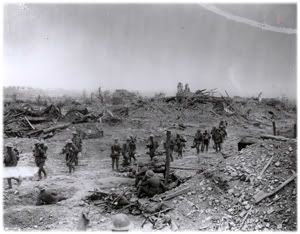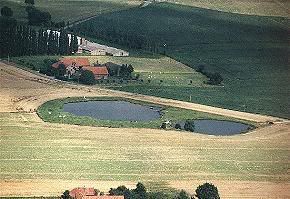|
myOtaku.com
• Join Today!
My Pages
• Home
• Portfolio
• Guestbook
• Quiz Results
Contact Me
E-mail
• Click Here
OtakuBoards
• SomeGuy
Vitals
Birthday
• 1983-08-05
Gender
•
Male
Location
• Vancouver, BC
Member Since
• 2003-08-02
Occupation
• Writer; Part-Time Hero
Real Name
• James
Personal
Achievements
• Visiting eight different myO friends in person thus far
Anime Fan Since
• Winter 2001
Favorite Anime
• Neon Genesis Evangelion, .hack//SIGN, Naruto, Bleach, Beck, Peacemaker Kurogane, Ranma 1/2 (the guilty pleasure)
Goals
• Visit the myO friends I've missed thus far; complete a cosplay from 300
Hobbies
• Writing, Gaming, Kung Fu, Movies, Acting somewhat strange in general
Talents
• Can recognise most quotes from almost any movie/show on first listen; Can recite the entire 12 days of Christmas by memory
|
|
|
Tuesday, November 7, 2006
The Battle of Messines, 1917
(An addendum to my Battle of Gallipoli post and following questions:)
I learn about these battles from all over. In class, on tv, in movies, in books . . . sometimes they just come up as sidenotes to other things I'm looking up at one point or another . . . then for these, I do some quick internet research, try to summarise, and then put it out in this way.
It's hard to say that the casualties were for nothing, or that neither side gained anything. While the loss of life was incredible and ultimately no final exchange of land occured, there's a lot that did happen. After the Anglo-French forces retreated from Gallipoli, the Turkish army - who weren't "really" considered a dangerous force in the scheme of things by people like the Russians - were now an undisputed fighting force. Further, this battle gave way for Mustafa Kemal, the Turkish commander at Gallipoli, to gain some real power and in 1934 he became president of the Turkish Republic.
As for the British, their reputation had been smashed up. A lot of officers were punished or resigned (including one younger Winston Churchill). WW1 was the beginning of the end for a lot of Empires, and the British one was no exception; Gallipoli was just another nail in the coffin.
That said . . . who knows how long it would have been before Australia and New Zealand became their own independant countries had this moment not occured? I'm sure it probably would have happened eventually anyway, but y'know, this moment really did solidify their resolve as their own nations - at least in the minds of people who think in these sorts of terms.
--------------------------------------------------
As I've mentioned in my other posts about WWI, oftentimes battles came down to poor execution of poor plans. Massive loss of life for all sides, very little or no gain, and a real sense to the futility of it all. Now, the battle I'm about to tell you is a slightly different kind of beast. This had extensive planning, swift execution, and relatively less loss of life for the attackers. Does this make it a better battle than the others? That depends on how you consider these things.
The Battle of Messines in Belgium, a precursor of sorts to the much larger and more vast Battle of Passchendaele, more or less began when German forces captured Messines Ridge in the First Battle of Ypres, a high strategic point near the village of the same name. This ridge was easy to defend, acted as a natural strongpoint, and jutted out into the allied battle line as a salient surrounded on three sides by the British. As the war continued, Allied Generals - Douglas Haig in particular - started planning for an eventual battle what would drive a hole through the German lines and capture their submarine bases along the Belgian coast. First off, they had to get past the ridge with all the guns on it . . .
General Plumer of the British 2nd Army began plans to make an attack possible at the beginning of 1916. His plan: to dig mines underneath the German positions on the ridge, pack the mines with as much explosives as possible, and then when the time came, set off the mines and charge up the hill afterwards. Seems like a pretty obvious plan, right? Well . . . the tunnelling of 22 separate mine shafts into the ridge took over a year.
It was meticulous. British and German engineers were digging mines through Messines Ridge, and stories of opposing men digging into each other and fighting underneath the trenches was not unheard of. Nevertheless, after digging twenty-two mines - 8 kilometers of tunnels - for over a year (although one mine was discovered by the Germans and destroyed) and packing them with 450 tonnes of Ammonal and then, the British were set.
On May 21st, 1917, the British commenced heavy bombardment of the ridge; over 2000 artillery guns shelled the German trenches for over two weeks until they stopped in the early morning of June 7th. Now generally, after you shell a position like that, an infantry advance is usually the next step. Anticipating this, the Germans all rushed back to their positions in their trenches, manning their machine guns and mortars, waiting for the expected rush of men to attack . . .
The British blew up the mines.
I don't have anything to compare it with, but most accounts call it the biggest manmade explosion ever recorded for the time. The sky lit up like "a pillar of fire"; the sound of the explosion could be heard as far away as Dublin, Ireland; in Switzerland the explosions registered as an earthquake. In context of the battle itself, the entire crest of the ridge was blown clean off, and about 10,000 German soldiers were killed.
The Allies immediately took the ridge and held it despite German counterattacks for the following week. It was the first time on the western front that an attacking force suffered fewer casualties than the defending one - 17,000 allied casualties compared to 25,000 German ones. Allied morale was obviously boosted after this, and the path to the following Battle of Passchendaele was open.
As a final follow-up, two of the twenty-one mines did not detonate that day. A thunderbolt set off one of the mines almost 40 years later, leaving a crater in the farmland and one dead cow; the second one has apparently been located, but plans to disarm it have not been made.
So now we look at it. One of the "successful" battles of WWI. Tens of thousands of casualties still came out on both sides during it, but substantially less so for the Allies. Likewise, what can we say about the immediate deaths of ten thousand German soldiers? We can always easily condemn the huge losses of civilian lives throughout the wars, but in this case all losses in this bombing were strictly military, no way around it. I find this battle leads to very mixed feelings. It was both life-saving and death-dealing; it saved thousands of allied lives at the cost of immediately taking ten thousand enemies. I really can't put my feelings or sympathies for one or another. I can only really say that it happened, and it was something incredible, whether it be for good or bad.
Somethin' to think about, in any case.

(Battle of Messines Ridge, 1917)

(Craters from the mine explosions today)
Comments
(5)
« Home |
|